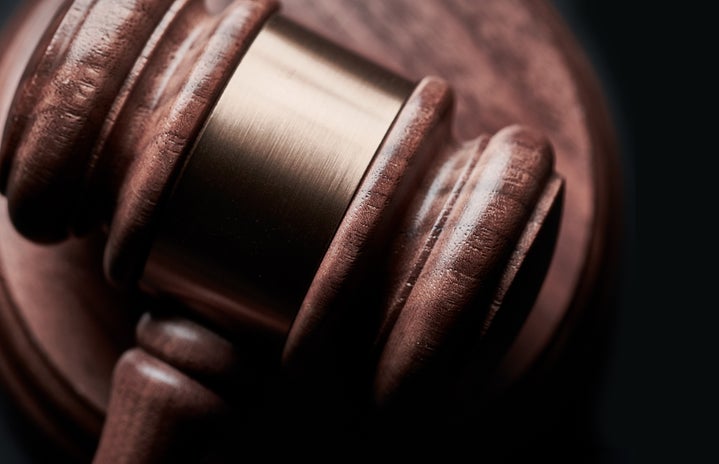In September 2019, Chanel Miller came forward and broke away from the shield of her anonymity to tell the story of how she was the one who survived the infamous Stanford sexual assault committed by Brock Turner. Chanel turned her pain into power in the style of a chilling but also moving memoir, granting a powerful voice to the millions of voiceless victims.
TRIGGER WARNING: SEXUAL ASSAULT
Brock Turner’s incredibly lenient sentencing back in June of 2016 sent shockwaves across the world. Turner was sentenced to six months, of which he only served three, after he was found guilty of sexually assaulting an unconscious Chanel Miller (Emily Doe during the investigation and the trial) near a dumpster outside of a fraternity.
Turner’s assault was stopped by two men passing by on bikes, who held him down until the police arrived. Throughout the investigation and the trial, Chanel’s drinking habits were condemned and Brock’s different athletic and academic accomplishments were praised in an attempt to defend his character.
After years of living under a different identity, Chanel broke away from being Emily. She wrote a powerful memoir describing her experiences from the assault, investigations, the trial, the sentencing, and her life thus far, after everything she’s been through.
“I wanted to explain that Chanel’s social life was healthy and well populated, but it was lonely being Emily Doe, my world much smaller, a shrunken circle of confidants.”
Chanel’s method of writing and storytelling are a significant part of what makes the book so impactful. Through her stylistic choices, it feels as if the reader is being placed into different parts of her life as a bystander, listening to her narration as you watch everything unfold. This takes you through a rollercoaster of emotions, not only accentuating the likelihood of empathizing with her, but also feeling the weight of her pain pushing down on you, demanding for it to be felt.
Chanel often refers to Emily Doe, the name assigned to her to protect her identity, as an entirely separate character. But throughout reading, you can’t help but feel both Chanel’s and Emily’s pain.
“Each time, I could see myself sleeping on the gurney. Present me did not want to wake her up and tell her what happened.”
In the beginning, you feel helpless as she goes through her initial examinations at a hospital, unaware of what has happened to her. The way she explains her confusion and her fear make you want to reach through the pages and hold her hand through everything. As the timeline progresses, that initial fear is manifested into grief, anger, resentment, frustration, confusion among so many others. Your heart sinks when she recounts first learning about the details from her assault while reading the news at her desk at work.
Your chest fills with anger as her character is called into question via comments on news articles. She is portrayed as the careless victim who should have done more to prevent being assaulted, rather than someone who had their bodily autonomy stripped away and rightfully deserves justice for it.
Your face will feel hot as you read about how Brock’s character was consistently defended, from the original articles about his arrest all the way up to the testimonies by his family, ex-girlfriend, and former teacher during the trial and testimonies.
The underlying theme embedded in Chanel’s writing is the concept of not being the “perfect victim” due to her drinking and how that affected every choice that was made throughout the legal processes. Not being able to fit this nearly impossible mold is what often leads to the injustice performed against victims and the way Chanel portrays that concept is impossible to put into words.
“I didn’t know money could make the cell doors swing open. I didn’t know that if a woman was drunk when the violence occurred, she wouldn’t be taken seriously. I didn’t know that if he was drunk when the violence occurred, people would offer him sympathy.”
Chanel’s story is one of David vs Goliath. However, instead of one person against a massive giant, it is one person against an unfairly balanced legal system, white privilege, the public opinion, and the power of money. Brock may have been convicted, but his status as an “otherwise upstanding citizen” along with a top notch lawyer paid for by his parents, really just ended up with a slap on the wrist. What should have been a clearly long conviction turned into a sentencing shorter than the average college semester.
Due to this pathetic attempt at justice, the judge who sentenced Brock was recalled from his position in a later California election. He will forever be linked to this case, and so will Brock, and so will Chanel. But Chanel has the power of the truth on her side, and she portrays this truth throughout this book.
“And finally, to girls everywhere, I am with you. On nights when you feel alone, I am with you. When people doubt or dismiss you, I am with you. I fought everyday for you. So never stop fighting, I believe you.”
I absolutely recommend this book to everyone, but especially to college students. Chanel’s powerful story provides comfort and a voice for victims, while also helping those who aren’t victims get a better understanding.
Readers can get a stronger understanding of the inner-workings of this case while also learning about how unfairly victims are treated. It’s a difficult read, and you may often need to put it down to take a break. But reading her story from cover-to-cover is the only way you can begin to understand Emily, Chanel, and victims everywhere.


